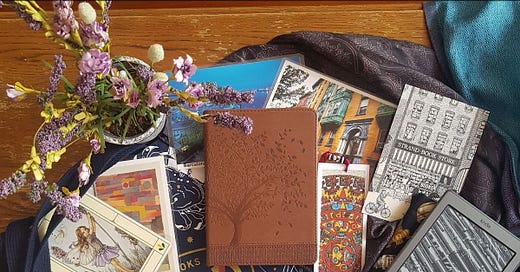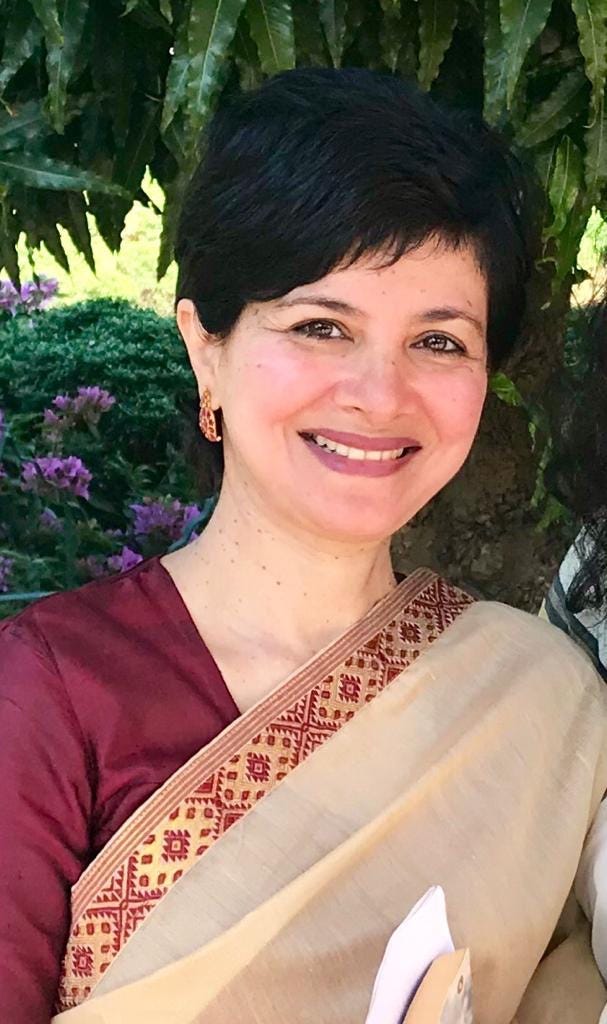The Storyteller: Jahnavi Barua
Hi and welcome to Issue #19 of The Storyteller!
If you aren't yet subscribed to the newsletter, you can change that here.
The newsletter completed one year on March 5 and I wanted to thank each one of you who has read my issues over the past year, sent comments, and offered love and support. It means a lot!
Today's guest is Jahnavi Barua. Jahnavi is an author from Assam now settled in Bengaluru who has published two novels (her latest is the 2020 release Undertow) and a short story collection to critical acclaim, including making the shortlist for the Man Asian Literary Prize and the Commonwealth Book Prize, the longlists for the JCB Prize for Literature and the Frank O'Connor International Short Story Award.
Anu: It’s always interesting to read about a writer’s journey and what has shaped it and them. How they got to where they are, when they knew they wanted to be a writer, whether they explored other professions first, what fascinates them about storytelling, whether they were a voracious reader as kids and grew up surrounded by books, the places that they lived in and the experiences that go into their work. What’s your story?
Jahnavi: I have been a reader for as long as I can remember and that goes deep into early childhood. Reading is something that has been a part of my daily life and, to me, is as natural as breathing. While I loved books and reading, I never planned to become a writer; in fact, I studied medicine and am/was a doctor until my son was born a couple of decades ago.
At that point, I took a break to look after him, but this short break became a long one and I did not go back to medicine eventually. While I was looking after my son, during the first couple of years of his life, I read extensively and in particular, short fiction. It was after I had reread almost all of one of my favourite writers—Alice Munro—I felt the first stirrings of wanting to write a story myself. That was how my writing journey began.
Anu: What was your experience like with working on those initial manuscripts, finding an agent and then getting one picked up by a publisher? Any advice you wish you had back when you were first starting out?
Jahnavi: I think I have been very fortunate in my publishing journey. One of my early stories, "Next Door" was picked up by Penguin India for its annual anthology called First Proof, and then the editor who had picked it up asked if I had a novel or short stories ready. I did not have a novel but sent off a bunch of stories, and from these my first anthology of short stories called Next Door was published. My next book and first novel was again picked up Penguin India as was the latest one, Undertow.
I did not have an agent for the first book, but had agents for the second and third. Fortunately, here again, I did not have difficulty finding an agent. The first time around, I simply wrote to an agency a writer friend had recommended in London and they called back to accept me within three weeks. I moved from this agency to another one with more of an India focus and this too happened seamlessly.
Anu: In my observation, the Brahmaputra river seems to feature as its own character in your work. Could you walk us through its importance and significance?
Jahnavi: The Brahmaputra dominates not just the landscape but life in Assam. As a child, I lived for a while in a house that stood on a cliff right on the river. From this vantage point, I watched the river flow through the day and the changing seasons—a panorama that imprinted itself on my mind and soul. The river follows me wherever I go and thus, naturally, finds its way into my work.
Anu: Your stories deal with themes of identity, belonging, displacement, and the idea of home. How have your own experiences shaped and influenced them? What compels you to tell these stories?
Jahnavi: As a child, and for a large part of my adult life, I have lived a nomadic life, moving from city to city, and this process of putting down roots and then pulling them out so often has taught me just how precious home and belonging is. Perhaps, this understanding is what compels me to revisit these emotions.
Anu: Another observation is that you craft stories of interiority, intensely intimate stories of interpersonal relationships and conflicts against the backdrop of the world at large and the conflicts and goings on in it. It seems to be a conscious decision and it would be interesting if you could shed some light on the choice.
Jahnavi: Yes, I do examine the world from within. From within a person and from within the cocoon of a family. Family for me is that critical space where a person becomes who he or she is—everything that you experience later in the wider world is something you go through in the family. This is where you learn love, hatred, loyalty, betrayal and every other emotion possible. This fascinates me and I deliberately put my writing at the centre of it.
Anu: Is there a writer’s manifesto that you wish your readers to leave with when they finish reading your work?
Jahnavi: I would like my work to change my readers in a meaningful way. I would love to stir emotions and raise questions within them that did not exist before and I would love to have these enrich their lives.
Anu: What is it that you love and find difficult about writing? Has that changed in all these years?
Jahnavi: I love the deep sense of connection I feel with myself when I write. To be able to write, a writer has to know herself intimately and every time I write I am forced to examine myself. After I publish a piece, I love the connection it triggers with readers. What I find most difficult about writing is finding the time to do it in!
Anu: As a writer from the North-East of India (or even just as an Indian writer), do you feel like you’re expected to write certain types of stories? How do you navigate those demands, however subtle and unspoken, without them interfering with the stories you want to tell? Going off from that, can you name any obvious writing influences?
Jahnavi: No, I have not felt any pressure regarding what I choose to write about. Perhaps because I have been very clear, within myself and to others, about what it is I want to say.
There are many writing influences, but the most dominant ones have been those short story writers I admire so deeply - Alice Munro, Faulkner, Chekov, Chugtai and Indira Goswami, among others. The precision and spareness of a short story enthralls me and I seek, again and again, to achieve that in my writing.
Anu: On that note, could you recommend some North-East authors and works to the readers of my newsletter?
Jahnavi: There are so many but just to name a few - Dhruba Hazarika, Mitra Phukan, Mamang Dai, Janice Pariat, Siddharth Deb, Aruni Kashyap, Kaushik Barua and Anjum Hasan.
Anu: What’s in the works going forward?
Jahnavi: More writing—I hope!
---
1. What's the last book(s) that you read that you'd recommend and why?
Disgrace by JM Coetzee for the sheer craft of writing and how it triggers such intense emotion.
2. What's the last TV show or movie you watched that you'd recommend and why?
The Netflix documentary on Amy Winehouse. It inspired a range of emotions in me: awe at just how brilliant she was and sorrow at how destructive!
3. What's the last song you listened to that you'd recommend and why?
Again, Amy Winehouse's "You Know I'm No Good". This song reveals such deep insight of one's own self; something very interesting to a writer.
---
Thank you, Jahnavi for this wonderful insight into your writing life and mind.
As always, I've included both mine and Jahnavi's social media links below. There are buying links as well, which include links through my own online affiliate shop for Bookshop.org, which supports independent bookstores. I have a separate section on there titled "The Storyteller newsletter" so you can access the relevant buying links for all the authors I've had on here so far.
If you enjoyed this and know someone who would, as well, please forward this to them! I'm also always up for a book (or general) chat so feel free to turn this into a conversation at any time by replying to the email, even if just to let me know your thoughts on an issue or if you have any feedback, but also if you must share with someone how awesome something is that you've recently read, watched, or listened to.
On that note, I want to let you all know that The Storyteller is going on a break for a few months, so I can focus more of my energies on some ongoing personal writing projects and assignments. I aim to be back in the summer with a great line-up to make up for it.
Thank you and until next time! As I wrote at the start of this issue, I really appreciate the love and support for my little venture over the past year of its presence in the world and I can't wait to share the authors I've already booked for later in the year and the ones that will get added.
Anu
Currently reading: Faces in the Crowd by Valeria Luiselli
Currently watching: This is Us (season 5), Zoey's Extraordinary Playlist (season 2), One Tree Hill (season 6 rewatch)
Latest writing: My review of Arsène Wenger's recent biography went live on Football Paradise last week and you can read it here.
I also wanted to shoutout "Too Much to Say" - a newsletter by my friend and fellow writer Nicó Morales with his musings on film, philosophy, and occasionally football. If this sounds like something you'd enjoy reading, go subscribe here! I would definitely recommend you checking out at least one of his previous issues.
---
Instagram
Buying links:
Amazon
Amazon India





